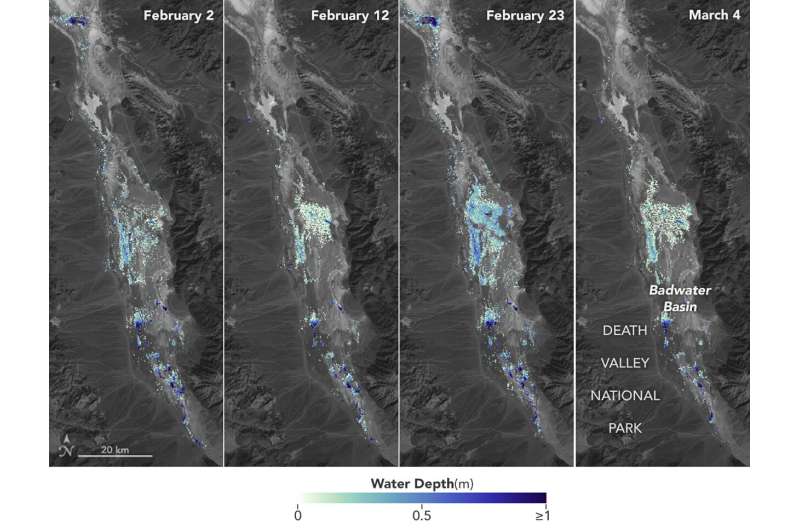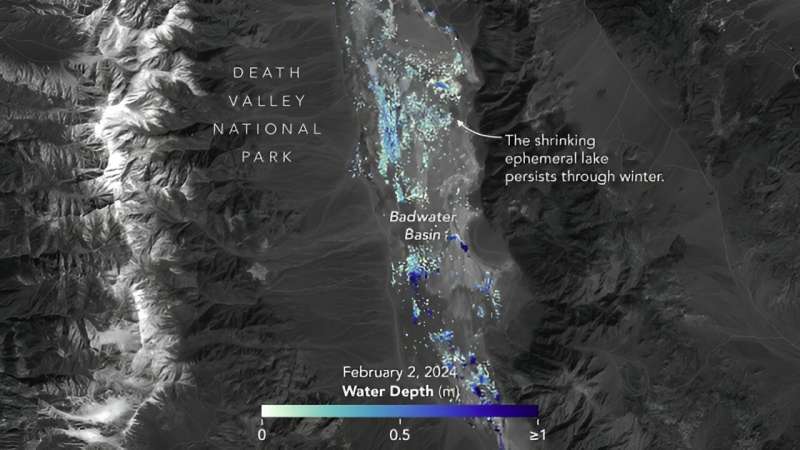This article has been reviewed according to Science X's editorial process and policies. Editors have highlighted the following attributes while ensuring the content's credibility:
fact-checked
trusted source
proofread
SWOT satellite helps gauge the depth of Death Valley's temporary lake

California's Death Valley, the driest place in North America, has hosted an ephemeral lake since late 2023. A NASA-led analysis recently calculated water depths in the temporary lake over several weeks in February and March 2024, demonstrating the capabilities of the U.S.-French Surface Water and Ocean Topography (SWOT) satellite, which launched in December 2022.
The analysis found that water depths in the lake ranged from about 3 feet (1 meter) to less than 1.5 feet (0.5 meters) over the course of about 6 weeks. This period included a series of storms that swept across California, bringing record amounts of rainfall.
To estimate the depth of the lake, known informally as Lake Manly, researchers used water level data collected by SWOT and subtracted corresponding U.S. Geological Survey land elevation information for Badwater Basin.
The researchers found that the water levels varied across space and time in the roughly 10-day period between SWOT observations. In the visualization above, water depths of about 3 feet (1 meter) appear dark blue; those of less than 1.5 feet (0.5 meters) appear light yellow. Right after a series of storms in early February, the temporary lake was about 6 miles (10 kilometers) long and 3 miles (5 kilometers) wide. Each pixel in the image represents an area that is about 330 feet by 330 feet (100 meters by 100 meters).
"This is a really cool example of how SWOT can track how unique lake systems work," said Tamlin Pavelsky, the NASA freshwater science lead for SWOT and a hydrologist at the University of North Carolina, Chapel Hill.

Unlike many lakes around the world, Death Valley's lake is temporary, relatively shallow, and strong winds are enough to move the freshwater body a couple of miles, as happened from Feb. 29 to March 2. Since there isn't typically water in Badwater Basin, researchers don't have permanent instruments in place for studying water in this area. SWOT can fill the data gap for when places like this, and others around the world, become inundated.
Since shortly after launch, SWOT has been measuring the height of nearly all water on Earth's surface, developing one of the most detailed and comprehensive views of the planet's oceans and freshwater lakes and rivers. Not only can the satellite detect the extent of water, as other satellites can, but SWOT is also able to measure water surface levels. Combined with other types of information, SWOT measurements can yield water depth data for inland features like lakes and rivers.
The SWOT science team makes its measurements using the Ka-band Radar Interferometer (KaRIn) instrument. With two antennas spread 33 feet (10 meters) apart on a boom, KaRIn produces a pair of data swaths as it circles the globe, bouncing radar pulses off water surfaces to collect surface-height information.
"We've never flown a Ka-band radar like the KaRIn instrument on a satellite before," said Pavelsky, so the data represented by the graphic above is also important for scientists and engineers to better understand how this kind of radar works from orbit.
Provided by NASA





















